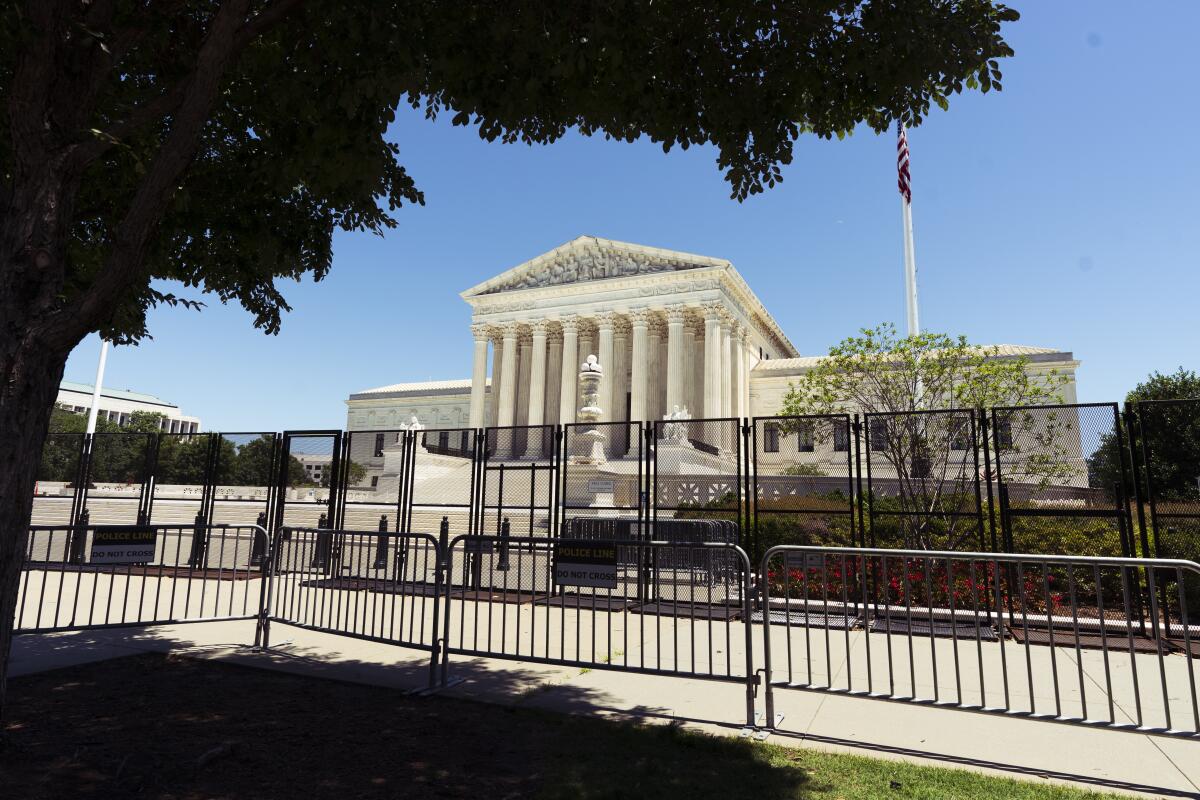Newsletter: A supremely troubling Supreme Court session

Good morning. I’m Kerry Cavanaugh, and it is Wednesday, July 3. The Opinion newsletter team is taking a few days off so there will be no email from us in your Saturday inbox. We hope you have a restful and happy Fourth of July.
The U.S. Supreme Court released in the final days of its session a flurry of consequential opinions on abortion, guns, social media, Jan. 6 rioters, homelessness, federal regulatory power and, perhaps the most eagerly awaited decision, whether President Trump has immunity for crimes committed while in office.
The answer: Former presidents including Trump cannot be prosecuted for officials acts. The conservative majority’s expansive view of official acts will make it much more difficult to hold the former president accountable for trying to overturn the results of the 2020 election, explains Opinion columnist Harry Litman, a veteran of the U.S. Justice Department.
The court’s delays also make it a near certainty that Trump will not be put on trial before the November election. “If Trump wins that election, he could move to abort the prosecution,” The Times’ editorial board writes. “In that event, justice delayed truly would be justice denied.”
And, the decision gives future presidents a road map to abuse their power, break the law and avoid culpability — by couching their deeds as “official acts.” A court can’t look at a president’s motives, notes Erwin Chemerinsky, dean of the UC Berkeley School of Law.
In another opinion, the court effectively gutted a 40-year-old precedent that empowered federal agencies to regulate polluters, financial markets, drug companies and other industries, a decision that will delay or weaken consumer protections. It may take a while for the full impact of this session to be felt, but make no mistake, the conservative majority, which includes three justices appointed by Trump, is rewriting the rules of government in ways that will change lives. Elections have consequences.
“These decisions — as with the overruling of Roe vs. Wade and the expansion of gun rights in recent years — simply would not have happened if Hillary Clinton had won the presidency in 2016 and she had picked three justices,” Chemerinsky wrote. “These decisions cannot be explained by precedent or interpretive methodologies. They are simply a matter of conservative justices imposing conservative ideology to come to conservative results.”
Grants Pass ruling will do nothing to end homelessness. The Supreme Court’s decision to allow cities to criminalize sleeping outside on public property will make it harder for people to leave homelessness, writes The Times’ editorial board. “Impoverished people cannot pay fines, and so the penalties accumulate — sometimes going on their credit report or triggering a court bench warrant for failure to pay. That only hurts their chances of finding housing when they get a rental subsidy and apply for an apartment.”
If you were relieved by the Supreme Court’s abortion rulings this term, think again. The court’s decisions in two major abortion cases didn’t make things worse for reproductive rights. That’s a win, right? Not really, writes UC Davis Law Professor Mary Ziegler. “In reality, there is no relief in sight for pregnant patients facing the dangers of a post-Roe America.”
Enjoying this newsletter? Consider subscribing to the Los Angeles Times
Your support helps us deliver the news that matters most. Become a subscriber.
July 2 is America’s true date of birth. Yes, we celebrate the Fourth of July, which is the date written on the Declaration of Independence, but the declaration itself was made on the Second. There is another reason to celebrate the Second of July, the editorial board writes. “The declaration, the Constitution, the Bill of Rights and numerous civil rights laws were more aspirational than real for a significant portion of the population until July 2, 1964. That’s the day President Lyndon B. Johnson signed the Civil Rights Act of 1964.”
Fentanyl could fuel another cycle of loss in L.A.’s Black communities. It doesn’t have to. From 2011 to 2021, more than 321,000 American children lost a parent to a drug overdose. Black children experienced the highest increases in the rate of such losses during those years, writes Jerel Ezell, an assistant professor of community health sciences at UC Berkeley. “One of our most powerful tools for preventing future overdoses is to take better care of the children most directly affected by today’s losses.”
More from this week in opinion
From our columnists
- Jackie Calmes: The Biden debate, the Supreme Court — the full catastrophe
- Jonah Goldberg: How Democrats’ defense of Biden reminds me of Republicans’ rallying around Trump
From guest contributors
- A Supreme Court ruling may help Jan. 6 rioters. Here’s why it’s less likely to help Trump
- Wildfire smoke kills thousands of Californians a year. It doesn’t have to be so deadly
- Will millennials decide this year’s elections in the U.K., U.S. and elsewhere?
From the Editorial Board
- Why Metro needs its own police force
- Drop in L.A.’s homeless population shows efforts to house people are paying off
Letters to the Editor
- Should Biden really drop out of the election?
- America is losing its religion. Louisiana shows the backlash is underway
- The Supreme Court’s surprising ally on its homelessness ruling
Stay in touch.
If you’ve made it this far, you’re the kind of reader who’d benefit from subscribing to our other newsletters and to The Times.
As always, you can share your feedback by emailing me at paul.thornton@latimes.com.
A cure for the common opinion
Get thought-provoking perspectives with our weekly newsletter.
You may occasionally receive promotional content from the Los Angeles Times.




